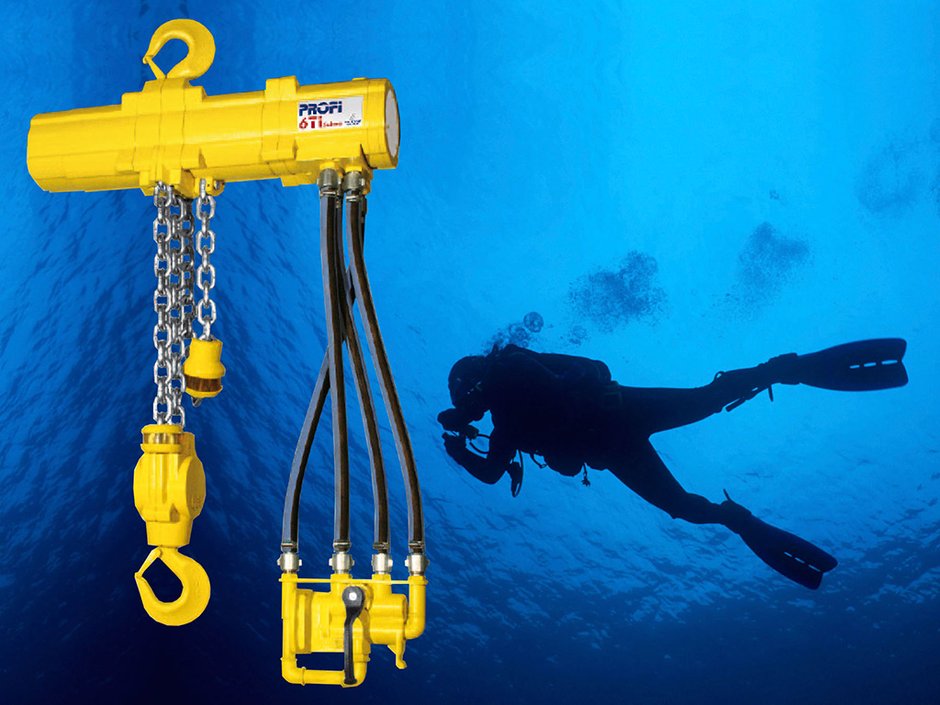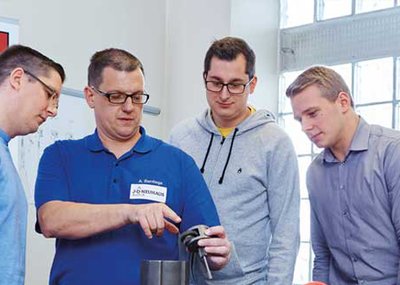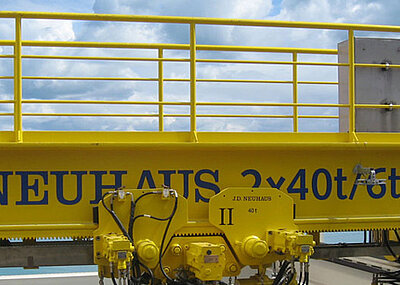The range of robust handling and lifting equipment supplied by the J D Neuhaus company is currently in use around the world on Jack-up rigs, Semi-submersibles, Drill ships and FPSO vessels. Their product range incorporates both air and hydraulically powered hoists, with individual lifting capacities ranging from 250kg to 100 tonnes. These products can also be incorporated into single or double girder overhead travelling cranes, underslung cranes with special low headroom trolley designs, together with purpose designed slewing jib cranes. Hoists can be supplied for specific function duties such as BOP handling (up to 200 tonnes), as well as providing virtually unlimited lifting and general load movement solutions including both oblique and horizontal pulling under pre-determined conditions.
A BOP handling unit incorporating four J D Neuhaus type EH50 air operated monorail hoists has been supplied to the Maersk offshore rig Guardian, for synchronised BOP lifting and handling during both pre and post drilling operations. Two hoists are mounted on each of the twin parallel overhead rails, with each hoist providing 50 tonne load and 20 metre lift capacities for between deck operations. With the two sets of hoists operating together, a combined lift capacity of 200 tonnes was made available. Synchronised operation of all linear movement and lifting operations of individual, paired or all the four hoists when used in conjunction, was provided with JDN type F multi-function controllers incorporating the main air emergency stop together with a load monitoring device.
The largest purpose built offshore crane system constructed to date by J D Neuhaus was a semi portal, A-frame design supporting twin overhead horizontal track beams each fitted with a single hydraulic EH 40-H hoist unit. These hoists can be operated individually or simultaneously from one controller, and when used in conjunction a total lift of 80 tonnes is possible with a 12 metre lift height being provided over a 7.5 metre span. A JDN Profi 6 TI-H hoist with 6 tonne lift capacity was also supplied to cover other operational and service requirements. The crane was specified to comply fully with offshore duties including operating at temperatures down to -20ºC. Survival conditions had also to be been maintained in turbulent weather conditions to cover inclines from the horizontal of the rig of 3º with the crane loaded or 27º when unloaded.
All the JDN products combine a rugged build quality with high performance, 100% reliability and the utmost in safety. Their JDN Profi TI hoists are also 100% duty rated and require low maintenance, so eliminating unnecessary downtime. The products are also impervious to dust and damp working conditions and operate within a temperature range of -20ºC to +70ºC. Where supplied for offshore operation, on either rigs or ocean going vessels, then the equipment is provided with a full ‘Offshore Package’ which includes extra corrosion protection to cater for rough, salty weather conditions. The main body component parts of both hoists and cranes are supplied with a four layer marine paint top coat, having a 280 microns total minimum dry thickness in standard traffic yellow RAL 1023 colour. Exposed products such as valves and valve heads, together with suspension chains are manufactured from stainless steel, together with bolts and nuts less than 12mm in size. Larger threaded bolt ends and nuts, together with trolley wheel bearings are otherwise protected with grease packed covers, while the chain containers are supplied with a galvanised finish.
All hoists in the JDN Profi TI range incorporate top hook suspension mounting and feature pendant push-button controllers as standard. These hand controllers provide sensitive, infinitely variable or single speed control of the load lift, lower and powered trolley traverse movements where overhead rail mounting is utilised. Trolley mounting options include manual, reel chain and motorised variations. All hoists are also fully ATEX rated for operation in hazardous or potentially explosive atmospheres to a standard classification of Ex II 2 GD IIA T4 / II 3 GD IIB T4.
Standard safety features of the hoists include integrated adjustable overload protection for load ratings of one tonne and above. A self-adjusting fail-safe braking mechanism is fitted, together with trolley anti-climb drop devices and an emergency stop switch integrated in the main power supply. An emergency lowering device can also be supplied for the Profi TI hoists covering lift capacities from 25 to 60 tonnes. This involves fitting a separate air tank, with two additional buttons also incorporated into the hand controllers. This air reservoir is automatically maintained at the full working air pressure and acts as a positive emergency braking system when required. The device becomes operable in the event of a severe reduction or total loss of mains air pressure, with a two-handed control operation provided to avoid unintentional lowering. One control button selects between normal hoist operation and emergency lowering, with a second button providing braking to ensure a controlled lowering and safe grounding of the suspended load under the action of its own dead weight.
Additional optional safety features include rack and pinion trolley drives, Delta-P overload protection and load monitoring together with air, hydraulic, radio or electrical remote controllers. Special purpose hoists engineered for extreme conditions can be supplied to cover operations at arctic temperatures down to 45ºC, together with underwater hoists for operation down to 70 metres below water levels.
Certification by Det Norske Veritas can also be provided on request, to comply with safety requirements involving applications for offshore cranes as well as power driven hoists. The standard ATEX classification is according to EC Directive on Hazardous Locations 94/9/EEC with increased spark protection also available if required to a rating EX II 2 GD IIC T4.
###COMPANY_LINK### <link record:tx_browserdirectory_directory:5013 internal-link>![]() J.D. Neuhaus GmbH & Co. KG
J.D. Neuhaus GmbH & Co. KG





